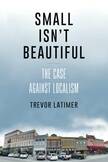Review: Sometimes bigger is better.
Buy local! Shop small! We tend to assume that these are good things to do, and even people with opposing political commitments find common ground in something called “localism.” But what is localism, and why do we assume it is good?
In his new book, Small Isn’t Beautiful: The Case Against Localism, Trevor Latimer defines localism as “prioritizing the local by making decisions, exercising authority or implementing policy locally or more locally.” Latimer evaluates a number of arguments in favor of localism and finds all of them wanting. Ultimately, he writes, “I am not arguing that localism has drawbacks, that it has failed to work in particular cases, or that it is inappropriate for certain issues. I am arguing that its drawbacks are endemic, it fails to work in most cases, and it is inappropriate most of the time.”
The book is dense with arguments, analysis and examples from a range of disciplines. Latimer’s “on the one hand...but on the other hand” style of argumentation helps put his thesis into action: While there can be certain goods that derive from localism and localist policies, many other goods are sacrificed at the same time. Choosing a policy that gives or takes away power or agency on a local level requires a cost-benefit analysis regarding what goods will be gained or sacrificed in the process.
Under localism, people might have lots of control over many small things but have little ability to influence bigger issues—say, global warming.
In general, Latimer is persuasive in demonstrating that localist policies often do not achieve what their proponents intend. A chapter about the “argument from democracy” is a good example. Latimer evaluates the localist claim that smaller governments are necessarily more democratic. It is true that “the larger the community, the less influence each citizen has over its decisions. The smaller the community, the more influential each citizen becomes.” He acknowledges that an individual citizen’s efficacy might matter “if democracy is about each citizen getting her own way as often as possible.” But, he asks, is that what democracy is about? An individual citizen’s efficacy might also matter if citizens then feel more interested in politics, become better informed and make good decisions. Democracy is sometimes less about good outcomes and more about the process itself.
On top of this, “small communities promote citizen effectiveness while reducing system capacity. Smaller communities have fewer resources; they govern fewer people and less territory.” Thus, “Projects that would have been possible in larger communities are constantly thwarted.” In other words, under localism, people might have lots of control over many small things but have little ability to influence bigger issues—say, global warming. Ultimately, “the one benefit available exclusively at the local level, direct experience, must be weighed against the benefits at higher levels.”
I consider myself to have some localist sympathies. Latimer has convinced me that I need to work harder to define and defend exactly what those sympathies are, and I am grateful that he has provided tools for thinking them through. Thanks to Latimer, I realize now that I have uncritically bought into the “argument from tyranny”—that centralization of power is “bad, evil, despotic, foolish” and that political power locally distributed is the opposite of those things. That may seem intuitively true; it certainly did to people like Montesquieu and de Tocqueville. But concentration and centralization of power are not the same, and there are tradeoffs to diffusing power too much. I am more convinced than I have ever been of the necessity for decision-making on a large scale to deal with large problems.
But the result of the density of Latimer’s book, and of such a wide-ranging, comprehensive purview, is that I came away feeling more stumped by individual cases of localism’s failures than convinced by an overarching vision. Where Latimer’s book seems weakest is the philosophy underpinning his analysis, what he calls a consequentialist and welfarist approach: the belief that it is the consequences of our actions that matter rather than intentions, and that we should base our decisions on what is good for people’s welfare—defined as “what makes people’s lives go well.”
“Although I have my own views about what matters for people’s welfare,” Latimer writes, “I’m keeping things vague intentionally. We disagree about what makes people’s lives go well.” But how do we judge whether people’s lives are going well? When people disagree about what is needed for life to go well, how do we know who is right?
The issue becomes clearer in Latimer’s analysis about the “argument from nature,” which holds that we should organize society around smaller social units because smaller groups are more natural to human beings. One could agree or disagree with this statement based on all kinds of evidence; Latimer argues against it by discussing recent scholarship in paleoanthropology. But regardless of what the evidence may show, Latimer insists, “Facts about human nature do not tell us how we ought to organize our social lives.... Facts about biology, custom, and tradition are useful, but it is up to us to decide what to do with them.”
I am more convinced than I have ever been of the necessity for decision-making on a large scale to deal with large problems.
Many religious and philosophical traditions, including Christianity, hold that nature is normative. Certainly, what counts as “natural” is contested. But if we don’t admit that what is natural gives at least some indication of the choices we should make, then we don’t have much basis to adjudicate different claims about “what makes people’s lives go well.”
Also in the chapter about the argument from nature, Latimer mentions the concept of subsidiarity in Catholic social teaching and offers a secular version for consideration. He writes that many localists see subsidiarity as an automatic argument for localism. But he points out, correctly, that subsidiarity means finding the appropriate level of government for making particular decisions or carrying out certain functions—and that this could be a bigger or even global decision-making body. How do we know what appropriate means?
“Catholic social doctrine has a view of the social order in which appropriate functions are revealed by reason,” he writes. But Latimer also believes that “the associations and organizations that are the best ones for the job—the ones that make people’s lives go better—are appropriate.” Again, how do we know?
Perhaps there is nothing eternally fixed about which level of government is best at dealing with a given issue. But might there be tendencies, and might these tendencies be based on the kinds of relationships and communities people are able to form within those structures? In his chapter about the argument from nature, Latimer observes, “When pressed, communitarians will admit that what they care about is the character of people’s relationships with one another in different settings, not size as such. But I think they are committed to arguing that the kinds of relationships they value are impossible in communities that exceed their natural limits, and the most important limits are physical and spatial.”
Localists may be committed to the latter point; I am not sure communitarians are. Latimer is right that we need to find the right scale for the job, and he is right to critique localists for assuming that this scale is the smallest one possible. But “the character of people’s relationships” seems incidental in Latimer’s analysis, where it should be a primary consideration, perhaps one that sometimes outweighs other considerations.











